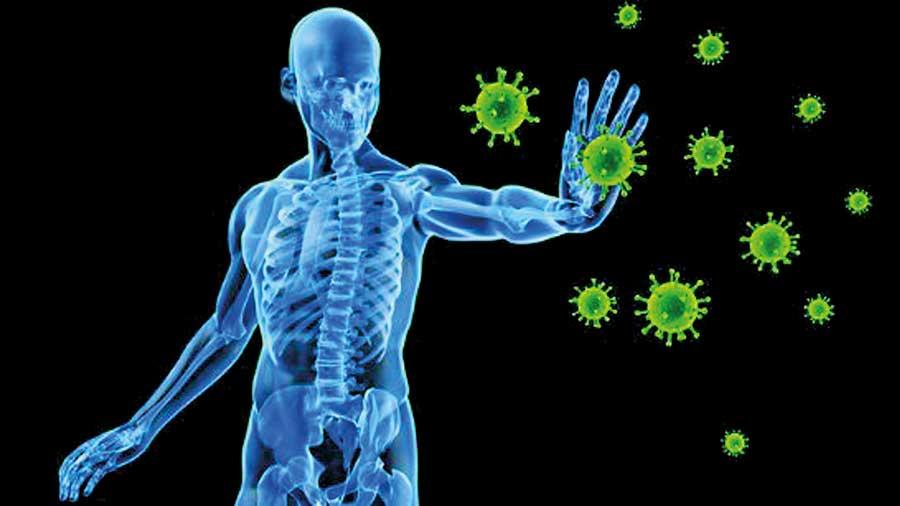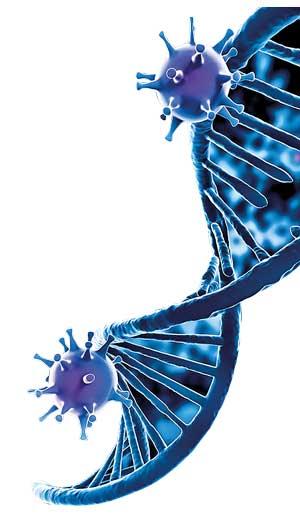29 Nov 2019 - {{hitsCtrl.values.hits}}

 The immune system of the body is like a natural body guard that comes as a bonus in life. It is the body’s defense against infectious diseases, ensuring a healthy and happy life. The immune system consists of a network of cells, tissues and organs that works together to protect the body.
The immune system of the body is like a natural body guard that comes as a bonus in life. It is the body’s defense against infectious diseases, ensuring a healthy and happy life. The immune system consists of a network of cells, tissues and organs that works together to protect the body.
However unfortunately, the functions of the immune system can be reduced and become inefficient due to various causes, thus letting its guard down and making the body more susceptible to infectious diseases.
It is important that we take care of the body’s defense source because without it, life would be more difficult or even impossible!
The Health Capsule spoke to Dr. Rajiva de Silva, Consultant Immunologist at the Medical Research Institute, in order to provide the society with a clear idea on the importance of a balanced and healthy immune system.
WHAT IS THE IMMUNE SYSTEM?
Dr Silva explained that the immune system is basically a particular system that is present to protect the body from harmful, disease causing microbes. He stated that the system comprises of many structures that prevents microbes from getting inside the body.
The skin, for example, consists of the mucous membrane which is lined by certain chemicals and acts as an external barrier to disease causing bacteria and other microorganisms.
However, if the external barriers are broken and if the microbes succeed in entering the body, certain chemicals and cells within the body will limit the infection and try to get rid of the invading pathogens. White blood cells are the main cells of the immune system that protects the body. Lymphocytes, monocytes, neutrophils and macrophages are the main type of cells involved in providing immunity to the body.
Dr Silva mentioned that although the immune system of the body is generally in a balanced state, there are situations where it fails to function effectively.
CAUSES AND EFFECTS OF THE IMBALANCE OF THE IMMUNE SYSTEM
When the immune system of the body is out of balance, it not only fails to protect the body but can attack it as well. This occurs when the system loses the ability to identify and distinguish its own body cells from the invading pathogens.
Therefore, the system will attack its own body tissues. This process is known as “autoimmunity”.

The human immunodeficiency viruses (HIV) causing acquired immunodeficiency syndrome (AIDS) is one of the main issues that arise due to the progressive failure of the immune system.
Dr Silva explained that this viral infection invades and destroys all important white blood cells further weakening the Immune system. Therefore, patients with HIV/AIDS will not be able to fight against infectious diseases.
According to Dr Silva, there are many genetic defects that cause the immune system not to function well. He stated that there are about 350 genetic diseases that causes immunodeficiency.
Type 1 diabetes is known to be caused due to such genetic defects. Here, the immune system attacks the insulin producing beta cells of the pancreas.
Dr Silva said that although it is not proven completely, an unfunctional immune system can lead to certain tumours and cancers. (Particularly, cancers of the lymph nodes).
He further said that artificial situations such as organ transplants can cause imbalance of the immune system. After transplantation of an organ, the immune system may regard the transplanted organ as a foreign source if the organ was a low match. Therefore, the body will reject the organ and attack it in an attempt to get rid of it.This is known as “Transplant rejection”.
Dr Silva mentioned that certain diseases cause reduction in the functions of the immune system as well. Diseases such as diabetes cause fungal skin infections due to the reduction of certain cellular functions. This occurs due to the decrease of neutrophil levels in blood.
SYMPTOMS OF A WEAK IMMUNE SYSTEM
Autoimmune disorders, inflammation of organs and loss of appetite are a few symptoms of a weak immune system.
Delays in the growth and development of children can also be a sign of decreased immunity.
KEEPING THE IMMUNE SYSTEM WELL BALANCED
Dr Silva stated that although there is no specific method to follow, it is possible to keep the immune system from going out of balance.
He said that conditions such as allergies trigger the system to fall out of place. Therefore, he advised patients to avoid consuming food that show allergic responses and cause inflammation.
Anaphylaxis is a serious life-threatening allergic reaction caused due to food, insect venom and certain drugs. Therefore, people who are allergic to such substances should avoid them at all costs.
Studies have revealed that the early introduction of allergic substances can block the allergic responses to that particular substance. Therefore, it is also a method that can be used to reduce risks of future allergies.
Dr Silva stated that receiving immunotherapy is quite helpful when the body requires help to destroy pathogens. Immunotherapy is a biological therapy that boosts the body’s natural defense system. This process helps to improve or restore immunity. Providing immunoglobulins help to build up parts of the immune system.
In the case of autoimmunity, Dr Silva stated that there is no other alternative than providing the patient with effective drugs that dampen out the responses of the immune system.
Dr Silva further said that ensuring a good match during organ transplants can reduce the need for immunosuppression.
Proper exercise also improves the functions of the immune system. It can boost the immune responses against infectious agents and certain cells improve their activities with regular exercise.
It has also been found out that over cleanliness can increase the risks of developing allergies and other diseases. This theory known as ‘hygiene hypothesis’ has now been modified to
‘microbiome hypothesis’.
Microbiomes are microorganisms that are present in the body, particularly the gut. If the normal composition of microbiomes is altered, people can become more vulnerable to diseases. Therefore, too much cleanliness can also cause problems.
21 Dec 2024 21 Dec 2024
21 Dec 2024 21 Dec 2024
21 Dec 2024 21 Dec 2024
21 Dec 2024 21 Dec 2024
21 Dec 2024 21 Dec 2024